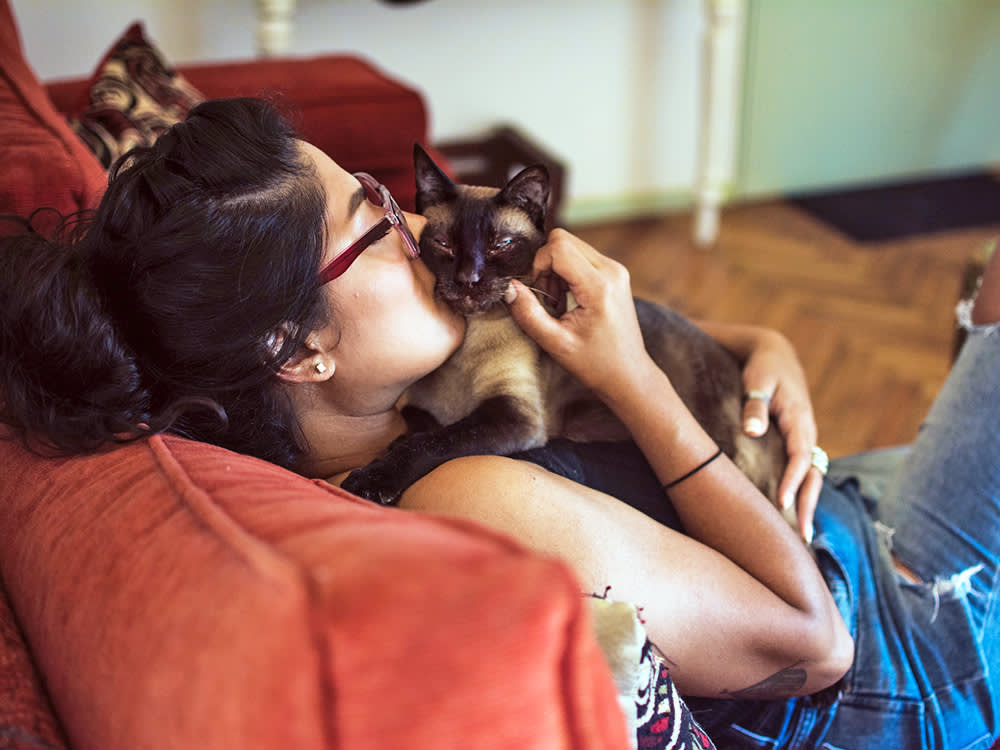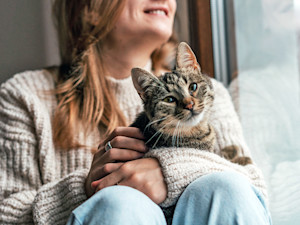Science Says Your Cat Knows Your Scent—Even If They Act Like They Don't
A new study proves your cat can tell you apart from a stranger.

Share Article
Cats have remarkably powerful noses, and you’re pretty much your cat’s best friend in the world, so it’s a given that your kitty would recognize your scent... right? You’re not just any old person to them, right?! Finally, science is confirming your hunch — and assuaging your fears. A new studyopens in new tab published in PLOS One found that cats do recognize their human’s scent.
Thirty cats were presented with three different tubes; one contained their pet parent’s scent (courtesy of a swab behind the human’s ear, armpit, and foot), one contained the scent of a stranger, and one was odorless. Pet parents also completed a survey on their cat’s personalities.

Save on the litter with color-changing tech that helps you better care for your cat.
When presented with the three tubes simultaneously, the cats spent more time sniffing the stranger’s scent than they did sniffing either their pet parent’s scent or the blank scent. These findings align with studies of cats’ behavior toward other cats. Research has found that kitten sniff unknown female catsopens in new tab for longer than they sniff their mother. Another studyopens in new tab found that adult cats sniff the feces of unknown cats for longer than they sniff those of cats in their social circle. Basically, this is a solid sign that you’re in your cat’s good books.
Interestingly, there’s some significance to which nostril the cat used to sniff. Cats used their right nostril more when sniffing an unknown person’s scent, and then shifted to the left nostril. When sniffing their human’s scent, they used their left nostril. Though it might look arbitrary to most of us, scientists say this behavior can be interpreted as further evidence that our pets recognize their person. “Studies have suggested that not only dogs but also fish, birds, and other vertebrates process novel information using the right brain hemisphere, which is then habituated and classified; the left brain is responsible for further behavior when a routine response emerges,” Yutaro Miyairi, the study’s lead author, wrote. In other words, it’s possible that cats took the unfamiliar scent into their right nostril to learn it, then switched to the left once they had adjusted.
Researchers also found that which tube the cats sniffed first gave an indication of their personality. The group that smelled the blank tube first scored higher on neuroticism, and the group that smelled the known scent first scored higher for extraversion. Cats who smelled either of the tubes containing human scents first scored higher for agreeableness than cats who sniffed the blank tube first.
It’s still not confirmed whether cats can identify specific humans — they definitely recognize your scent as a scent they already know, but science hasn’t yet proven that they recognize your scent as yours. Still, the study is a vital first step toward scientifically proving something you’ve probably already guessed (but could maybe use some reassurance on): You’re not a stranger to your kitty, after all.

Sio Hornbuckle
Sio Hornbuckle is a writer living in New York City with their cat, Toni Collette.
Related articles
![a tattooed person with curly red hair on a couch pets a brown and black cat]()
Your Cat Can Tell When You’re Stressed, Study Says
It’s all in their noses.
![Woman trying to get her pet cat's attention at home.]()
This Is the Most Effective Way to Get Your Cat’s Attention, Study Says
They can't ignore you forever.
![Woman holding cat in her lap at home.]()
Some Cats Make Great Therapists, New Study Finds
Certain kitties excel at animal-assisted services.
Cats Have the Same 4 Attachment Styles as People, Study Says
Is your kitty securely attached? Or are they more the avoidant type?
Why Is My Cat Suddenly Clingy?
They’re never far away, but you’d like a little distance.
![Woman snuggling her striped gray cat at home.]()
Cats Release Oxytocin When Cuddling With Humans—But Only on Their Own Terms
It all comes down to attachment styles.





